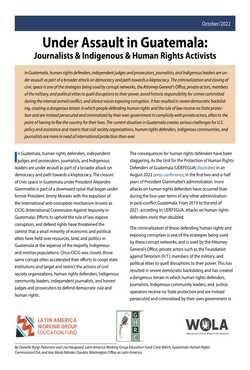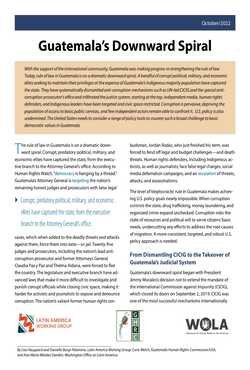By The Washington Office on Latin America, Latin America Working Group Education Fund, Due Process of Law Foundation, and Guatemala Human Rights Commission/USA
Guatemala’s justice system has been co-opted by a network of corrupt political, economic, and military elites seeking to advance their own interests and to ensure that their acts of corruption and grave human rights violations from the armed conflict remain in impunity, while silencing voices from civil society organizations and independent media. Honest judges and prosecutors have been criminalized, threatened, removed, or transferred from their posts by the very institutions supposed to be advancing the rule of law and justice. Twenty-five judges and prosecutors, including the nation’s lead anti-corruption prosecutor, have fled the country into exile. The impacts of the co-optation of Guatemala’s justice system will set the country back decades.
This report, produced by Washington Office on Latin America, Latin America Working Group Education Fund, Due Process of Law Foundation, and Guatemala Human Rights Commission/USA, provides analysis on the steps taken to undermine Guatemala’s justice system from the stacking of its highest courts with corrupt judges to the co-opting and dismantling of the Attorney General’s Office and specialized prosecutors’ offices. It explains the longer-term implications of the ousting of honest judges and prosecutors and a broken justice system for the rule of law, transitional justice and protecting freedom of expression and the rights of marginalized communities in Guatemala.
Washington, DC: The Authors, 2022. 10p.





